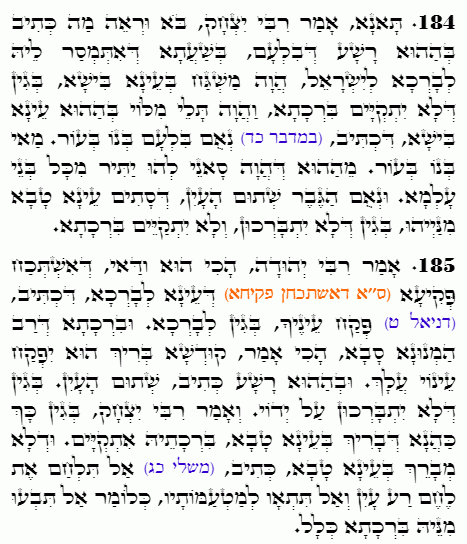Daily Zohar # 4584 – Naso – Seek open eyes for blessings
Daily Zohar 4584

Hebrew translation:
185. אָמַר רַבִּי יְהוּדָה, כָּךְ הוּא בְּוַדַּאי, שֶׁנִּמְצֵאת פְּתִיחַת (שֶׁנִּמְצֵאת פְּקִיחַת) עַיִן לְבָרֵךְ, שֶׁכָּתוּב (דניאל ט) פְּקַח עֵינֶיךָ, כְּדֵי לְבָרֵךְ. וּבִרְכַּת רַב הַמְנוּנָא סָבָא כָּךְ הָיָה אוֹמֵר: הַקָּדוֹשׁ בָּרוּךְ הוּא יִפְקַח עֵינוֹ עָלֶיךָ. וּבְאוֹתוֹ רָשָׁע כָּתוּב שְׁתֻם הָעָיִן, כְּדֵי שֶׁלֹּא יִתְבָּרְכוּ עַל יָדוֹ. וְאָמַר רַבִּי יִצְחָק, לָכֵן צָרִיךְ הַכֹּהֵן לְבָרֵךְ בְּעַיִן טוֹבָה, בִּרְכָתוֹ תִתְקַיֵּם. וְשֶׁלֹּא מְבָרֵךְ בְּעַיִן טוֹבָה, כָּתוּב (משלי כג) אַל תִּלְחַם אֶת לֶחֶם רַע עָיִן וְאַל תִּתְאָו לְמַטְעַמֹּתָיו. כְּלוֹמַר, אַל תְּבַקֵּשׁ מִמֶּנּוּ בְּרָכָה כְּלָל.
.
Zohar Naso
Continued from previous DZ
#184
Rabbi Yitzchak said, “We have learned what is written about that wicked man, Balaam. When he set out to bless Israel, he looked with an evil eye so the blessing would not endure. He based his words on his evil eye, as it is written,
Numbers 24:3
“וַיִּשָּׂא מְשָׁלוֹ וַיֹּאמַר נְאֻם בִּלְעָם בְּנוֹ בְעֹר וּנְאֻם הַגֶּבֶר שְׁתֻם הָעָיִן.”
“Then he took up his oracle and said: “The utterance of Balaam the son of Beor, The utterance of the man whose eyes are opened,”
‘What is the meaning of ‘the son of Beor’? It means he was one who hated them more than all the people in the world because ‘בעור’ ‘Beor’ is related to the word for hatred, like the word ‘עירין.’ And “The utterance of the man whose eyes are opened’ means that he closed off the good eye from them so that they would not be blessed and the blessing would not endure.
#185
Rabbi Yehuda said, “Indeed, it is certainly so that the opening of the eye is necessary to bless, as it is written, ‘Open Your Eyes’ (Daniel 9:18) to bless. And the blessing of Rav Hamnuna Saba was given in this manner: ‘May the Holy One, Blessed be He, open His eyes upon you.’ But about that wicked man, it is written, ‘שְׁתֻם הָעָיִן’ ‘with his eye closed,’ meaning that he did so to ensure that blessings would not be given through him. Rabbi Yitzchak said that because of this, a priest who blesses with a good eye his blessing endures. But one who does not bless with a good eye, it is written,
Proverbs 23:6
“אַל תִּלְחַם אֶת לֶחֶם רַע עָיִן וְאַל תתאו [תִּתְאָיו] לְמַטְעַמֹּתָיו.”
“Do not eat the bread of a miser (רַע עָיִן), Nor desire his delicacies;”
meaning, do not seek any blessing from him at all.
Lesson;
A blessing from a wicked or stingy person should be avoided. Even if we see both their eyes open, the good eyes are closed inside.
Rav Hamnuna Saba’s blessing, invoking God’s open eyes, illustrates the ideal approach to bestowing blessings.
{||}

 Previous: Naso
Previous: Naso

